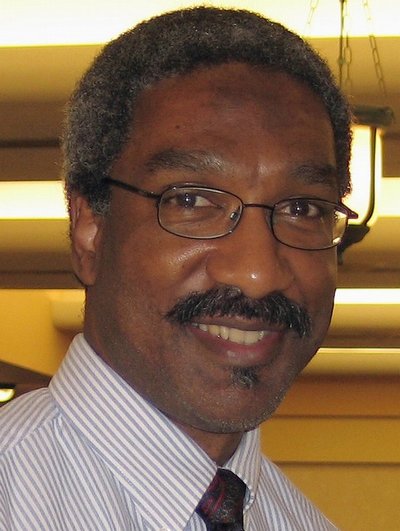October 1, 2009
Psychiatrist dedicated to improving lives, deaths of older adults
Judith Yarrow
Health Promotion Research Center
For the past 10 years, Dr. Mark Snowden, director of Harborview’s Geriatric Psychiatry Services program, has spent a day a week at Providence Mount St. Vincent Nursing Home in West Seattle. During his long day there, he sees the home’s residents as patients, supervises a nurse practitioner from the Harborview mental health program who provides services at the home, and mentors the psychiatry residents who spend six months there as part of their UW Residency Training program.
Snowden is a geriatric psychiatrist, specializing in the diagnosis and treatment of mental disorders of older adults since 1996. It isn’t a crowded field. According to the Association of Directors of Geriatric Academic Programs, in 2008 there were only 1,657 geriatric psychiatrists in the United States, one for every 11,451 Americans 75 and older.
How did a relatively young man get into such a field? For Snowden, it was his first job out of college that sent him in that direction. A native of Memphis, Tenn., he graduated from Princeton in 1984 with a BA in English literature. He liked working with children and was debating between a career as a teacher or a physician. A college adviser suggested he get a taste of the medical field before committing to it, and a job opening in a local community mental health center’s older adult services program brought him to Seattle. After two years, he discovered that he liked working with the elderly. “Lots of people find older adults boring, but I find them interesting,” Snowden said
When Snowden entered the UW medical school, he expected to become a geriatric internist, since his experience in dealing with the bureaucratic rules and regulations at the mental health center had been so frustrating, but by the time his residency rolled around, life as a psychiatrist looked like it wouldn’t be as frustrating as he’d feared. He earned his medical degree in 1990, completed the psychiatry residency in 1994 and geriatric psychiatry fellowship program as well as the master’s program in public health in 1996, all from the UW.
“As a faculty member of the medical school,” Snowden said, “I’m lucky to be able to have my clinical and research work line up nicely.”
Snowden’s most recent research on older adult mental health has focused on an in-home depression management program — the Program to Encourage Active, Rewarding Lives for Seniors (PEARLS) — that uses a problem-solving approach to help elderly people who have minor depression.
Snowden also works with Harborview staff on how to use the PEARLS approach for nursing home residents with depression, particularly those not responding well to antidepressants alone. Some of the components of PEARLS, such as increased physical activity and pleasurable events can be used with nursing home patients with conditions other than depression, such as in developing behavioral strategies for dealing with patients with dementia. “Even severely demented patients’ levels of agitation will decrease when they’re involved in some kind of structured activity,” he said.
Faculty members of the Health Promotion Research Center, an interdisciplinary research center in the UW School of Public Health, developed PEARLS in 1998 in partnership with staff at Seattle-King County Aging and Disability Services and the King County-based nonprofit Senior Services. Snowden became involved with PEARLS in 2006 as the clinical supervisor for the team, and for the past two years has led the program’s dissemination and implementation research. He also helps sites around the country implement the program
In the past, Snowden pointed out, mental health centers have used the same basic model of mental health case management for clients with depression as they do for those with schizophrenia, even though these are very different conditions. Case management models for schizophrenia patients often do not need to incorporate formal psychotherapies. In contrast, although treatment for depressed patients often does include psychotherapy, the range of treatment available to most publicly funded patients is quite limited. Complicating this even more, Medicare reimbursement typically does not cover services provided by bachelor’s level case managers. On top of that, older adults are more likely to have minor depression than major depression, but most older adults with minor depression, who would benefit from PEARLS treatment, don’t even qualify for treatment at most mental health centers.
As a result of his research with PEARLS, and the subsequent dissemination of the program, Snowden believes there’s a growing acceptance among aging services organizations of the value of treatment for depression in the elderly. Depression isn’t an inevitable and untreatable feature of old age, he says.
“Even when elderly patients have a lot of medical problems,” Snowden said, “they can often be helped. Most of the people I treat are very sick. They’ve suffered great losses of physical and mental health, and it would be easy to rationalize away their depression as a normal experience for them, but they can reduce their depression through treatment.”
But doesn’t the psychiatrist get a little depressed himself, given that he works with people at the end of their lives? “If you’re going to do this work, you have to come to terms with the fact that your patients are going to die,” Snowden said. “But dying is a natural process, and helping people have a quality death is as important as helping them have a quality life. I can help them decrease their fear and be able to die at peace. It’s a tremendous honor and opportunity to work as a researcher, teacher, and clinician toward improving the quality of their lives and their deaths.”



